2022 Annual Report
Thorough analysis. Independent review.
Aussi disponible en français sous le titre : Rapport annuel 2022
Information contained in this publication or product may be reproduced, in part or in whole, and by any means, for personal or public non-commercial purposes without charge or further permission, unless otherwise specified. Commercial reproduction and distribution are prohibited except with written permission from the Military Grievances External Review Committee.
For more information, contact:
Military Grievances External Review Committee
60 Queen Street, 9th floor
Ottawa, Ontario K1P 5Y7
www.canada.ca/en/military-grievances-external-review.htmlFootnote i
Canadian Armed Forces (CAF) photography is sourced from the Department of National Defence’s Combat Camera website: www.combatcamera.forces.gc.ca.Footnote ii The Canadian Forces Combat Camera (CFCC) team is composed of highly skilled Imagery Technicians, Public Affairs Officers and civilian specialists who work closely with CAF units and media organizations to highlight the hard work and dedication of CAF members in the air, on land and at sea. Deploying around the world, CFCC captures CAF operations and exercises, providing a visual historic record.
© His Majesty the King in Right of Canada, as represented by the Minister of National Defence, 2023
Cat. No. DG1-1
ISSN 2368-9986
Mandate
The Military Grievances External Review Committee is an independent administrative tribunal reporting to Parliament through the Minister of National Defence.
The Military Grievances External Review Committee reviews military grievances referred to it, pursuant to section 29 of the National Defence Act, and provides findings and recommendations to the Chief of the Defence Staff and the Canadian Armed Forces member who submitted the grievance.
31 March 2023
The Honourable Anita Anand
Minister of National Defence
National Defence Headquarters
MGen Georges R. Pearkes Building
101 Colonel By Drive
Ottawa, Ontario
K1A 0K2
Dear Minister,
Pursuant to subsection 29.28(1) of the National Defence Act, I hereby submit the 2022 Annual Report on the activities of the Military Grievances External Review Committee for tabling in Parliament.
Yours truly,
Vihar Joshi, OMM, MSM, K.C., C.D., LSM, CIC.C
Interim Chairperson and Chief Executive Officer
Table of contents

I am pleased to present the 2022 Annual Report of the Military Grievances External Review Committee (the Committee).
The Committee has one mandate: pursuant to s. 29 of the National Defence Act, the Committee reviews military grievances referred to it and provides findings and recommendations to the Chief of the Defence Staff and the Canadian Armed Forces member who submitted the grievance. We fulfill this mandate through our independent review and our thorough analysis.
For the third year in the last five, our ability to deliver on our mandate was hampered by lapses in Governor in Council appointees’ tenure. This reduced capacity, combined with an increase in the number of grievance referrals by the Canadian Armed Forces, not only significantly increased the number of grievance files awaiting review by the Committee, but extended the time Canadian Armed Forces members and redress authorities await our reports of findings and recommendations. Consequently, the Chief of the Defence Staff’s ability to render timely decisions, as the final authority in the Canadian Armed Forces Grievance System, is impacted. In the end, this delay renders an injustice to grievors who may have to wait significant periods to have their issues resolved.
Due to the situation over the last few years, the Committee undertook several mitigation measures to increase its efficiency. We upgraded our technology infrastructure and key information systems; reviewed and implemented lean and green business processes and shifted our work to the digital domain. We digitized the entire workflow of the grievance review process from reception to issuing reports to the Final Authority and the grievors. We triaged grievance files, adopted a flexible approach by establishing ad hoc teams to deal with specific issues and created developmental opportunities for key positions in the organization. We also leveraged specialized teams by subject matter to gain efficiencies. Any fiscal savings were reinvested towards supporting an increase in the number of staff conducting the analysis function. The conditions are now set to maximize our production capacity once our Committee Member’s cadre is back to and remains at full strength.
Meanwhile, we maintain our focus. Our reputation rests on the quality of our independent review and thorough analysis. The Committee is fortunate to have dedicated employees and Committee Members whose priority is to complete the work to the highest standards. The Committee is also fortunate to have determined leaders who support fulfilling the mandate, maintaining quality and nourishing the team’s mental health and wellbeing.
It is a privilege to be the interim leader of this unique organization. We seem to be of one mind with regard to the vision for the future and this only strengthens the resolve to get it done. The plan is to make 2023 the year in which we nurture the environment needed to fulfill our mandate as expeditiously as possible while preserving our people’s overall wellness.
I would like to end by recognizing the tireless efforts and significant contributions of Christine Guérette, our past Chairperson and Chief Executive Officer, and Dominic McAlea, our previous full-time Vice-Chairperson. Mr. McAlea served at the Committee for four years, bringing to bear his wisdom and experience to reviewing hundreds of grievances files and providing findings and recommendations with the highest integrity, thoroughness and perspective. Ms. Guérette served as Chairperson for four years and was truly visionary in her drive to ensure that the Committee could operate effectively and efficiently through a virtual workspace, long before it became either necessary or a popular concept. The implementation of her vision was key to enabling the Committee to deliver on its mandate throughout the pandemic. The halls of the Committee are better paved for their having been here. We wish them well on their respective journeys.
(original signed by)
Vihar Joshi, OMM, MSM, K.C., CD, LSM, CIC.C
Interim Chairperson and Chief Executive Officer
2022 at a glance
Our program: Independent review of military grievances
The Operations Team juggled two issues: stay the course to fulfill the Committee’s mandate to the best of its ability, despite the resource challenges, and explore all viable strategies to rebuild and augment capacity for the future.
Due to the significant shortage of Committee Members and the departure/absence of several experienced employees throughout the year, the Committee’s capacity to review grievance files diminished. In fact, we reviewed fewer files in 2022, in sharp contrast to the higher-than-usual number of Findings and Recommendations (F&R) reports issued in the two previous years, when the Committee had a full complement of Committee Members.
What remains paramount to the Committee is the calibre of our work. We are gratified by the fact that throughout this challenging period, our independence, our thoroughness and the quality of our F&R reports remained unchanged.
What remains equally paramount is our people and our tools/methods. It is important to ensure that our people are properly resourced and supported. Throughout 2022, we hired grievance officers to fill vacancies and provided them with training. In order to retain our employees and develop their talent, we were pleased to be able to offer professional development opportunities to employees who wished to reorient their careers and gain new experiences. After several years of interruption, the Committee resumed publishing its case summaries to the websiteFootnote iii . This is significant as publishing our case summaries provides easy and open access to a wealth of information for both Canadian Armed Forces (CAF) members and the CAF grievance teams. Thanks to the adoption and implementation of digital technologies, we are a modern, robust and agile administrative tribunal. Our grievance review teams, the Registry Office and Committee Members, empowered by our virtual workspace, have the tools they need to provide F&R reports as expeditiously as is reasonable to the Chief of Defence Staff (CDS) and to the CAF members who filed a grievance.
Even though the number of grievance referrals we received from the CAF in 2022 far exceeds the number of F&R reports we issued, we remain optimistic. The plan is that over the next two to four years we will be able to significantly reduce the number of active files with the anticipated appointment of a Chairperson, a full-time Vice-Chairperson and additional Committee Members; and the hiring of more employees. The Committee has a definitive plan to rebuild and augment capacity, starting mid-2023, with its full implementation in 2024. Better days are on the horizon!
How many grievances did the Committee receive and how many F&R reports did the Committee complete?
| 2022 | 2021 | 2020 | |
|---|---|---|---|
| Grievances received from the CAF | 345 | 322 | 226 |
| F&R reports delivered to the CAF | 142 | 341 | 263 |
What is the average number of months to review a grievance at the Committee?
| 2022 | 2021 | 2020 | |
|---|---|---|---|
| From the date assigned to a team to the date the F&R report was delivered to the CAF | 5.35 | 4.75 | 5.09 |
| From the date received at the Committee to the date the F&R report was delivered to the CAF | 10.56 | 10.91 | 11.15 |
How many mandatory and discretionary grievance referrals did the Committee receive?
| 2022 | 2021 | 2020 | |
|---|---|---|---|
| Mandatory referrals | 273 (79%) | 186 (58%) | 141 (62%) |
| Discretionary referrals | 72 (21%) | 136 (42%) | 85 (38%) |
Systemic issues raised by the Committee to the attention of the CDS
Backdating of compulsory occupational transfers
A grievor was required to change occupation, due to changes to his medical conditions, before he could achieve his initial qualification. The grievor argued that the process was improperly administered, taking far too long, and that the one-year delay impeded his career progression.
Referring to the Basic Training Administration Guide, the Canadian Forces General messages 257/10 and 112/14, and the Director Military Careers Administration (DMCA) Guidance to Leadership, the Committee found that the grievor's 17 month transfer process was in fact poorly administered by the CAF. As a direct result, the grievor suffered unnecessary and harmful delay to his career progression.
The Committee noted a recent Final Authority (FA) decision where a transfer approval was backdated. In that case, the FA concluded that the earliest date the DMCA could have approved a transfer was 90 days following the notification of the need to change occupation. The Committee agreed with that FA decision, recommending the FA grant redress by backdating the grievor's transfer approval to 90 days following the changes to his medical employment limitation. The Director Canadian Forces Grievance Authority, acting as FA, agreed with the Committee's findings and recommendation to afford the grievor redress. The FA agreed that the grievor's official cease training date was the date on which the Director Medical Policy deemed that the grievor’s chronic medical condition was in breach of the bona fide occupational requirement of his occupation.
The Committee has reviewed several similar grievances where CAF members experience multi-year delays in the administration of occupation changes. The Committee recommended that a policy be developed to accelerate the occupation transfer process and that, following any delay beyond 90 days, the date of the transfer be backdated to help minimize the negative and unintended impact to members.
Canadian Forces Integrated Relocation Program - Temporary Dual Residence Assistance Policy Review
A grievor disputed the Director Compensation and Benefits Administration (DCBA) decision that denied him entitlement to Temporary Dual Residence Assistance (TDRA) based on Canadian Forces Integrated Relocation Program (CFIRP) Directive 2009 and, more precisely, based on CFIRP 2010 - Clarification Bulletin 4 (Clarification of Principal Residence Actively Marketed) (“Bulletin 2010-4”). The grievor argued that the Bulletin should not take precedence over the CFIRP Directive and that the variation between his listing price and the appraised value of his residence was reasonable and consistent with the appraisal price and the conditions of the market.
The Director General Compensation and Benefits (DGCB), as the Initial Authority (IA), denied the grievance, finding that article 8.2.07 of the CFIRP Directive provided benefits associated with the expenses of maintaining two residences if the member's former residence remained unsold, vacant and actively marketed.
The IA determined that actively marketed was defined in Section 1 of the CFIRP and expanded upon in Bulletin 2010-4. The IA stated the Bulletin was Treasury Board (TB) approved and that TB had determined that for a residence to be considered actively marketed, the listing price could not be greater than the appraised value. Since the grievor's listing price was above the appraised value, the IA found that the grievor was not eligible for the requested TDRA benefits.
The Committee observed that the CDS had previously agreed with the Committee that there was no evidence that Clarification Bulletin 2010-4 was ever approved by TB or that it properly reflected TB's intent. The Committee noted that the CDS had directed DGCB to remove Bulletin 2010-4 from circulation, and observed that if TB had intended to limit TDRA benefits to only those CAF members who listed their residence at, or below, the appraised value, it would have amended the language in the CFIRP Directive long ago. The Committee concluded that Bulletin 2010-4 was of no force or effect and that it could not be used to establish TDRA benefits.
The Committee found that article 8.2.07 of the CFIRP Directive requires that in order to be actively marketed, the listing price could not diverge in any significant manner from the appraisal price. It did not need to be the same or even less, only similar. The Committee found that DGCB’s interpretation ensured that CAF members receive less than the value of their residence on posting. Finally, the Committee found that there was a discretion built into the policy and that it should be exercised when assessing the reasonableness of the listing price.
The Committee recommended that the FA afford the grievor redress by directing that the grievor be reimbursed the actual and reasonable expenses incurred while maintaining two residences. The Committee concluded that the DGCB interpretation negatively affected the interests of several CAF members and recommended that DGCB be directed to remove Clarification Bulletin 2010-4 from circulation. The Committee further recommended that DGCB be directed to conduct an audit of all TDRA claims between 26 April 2010 and the present day that were denied by the CAF on the basis that the listing price was higher than the appraised value. All such denials should be reviewed using only the wording contained within the CFIRP Directive itself to determine TDRA eligibility.
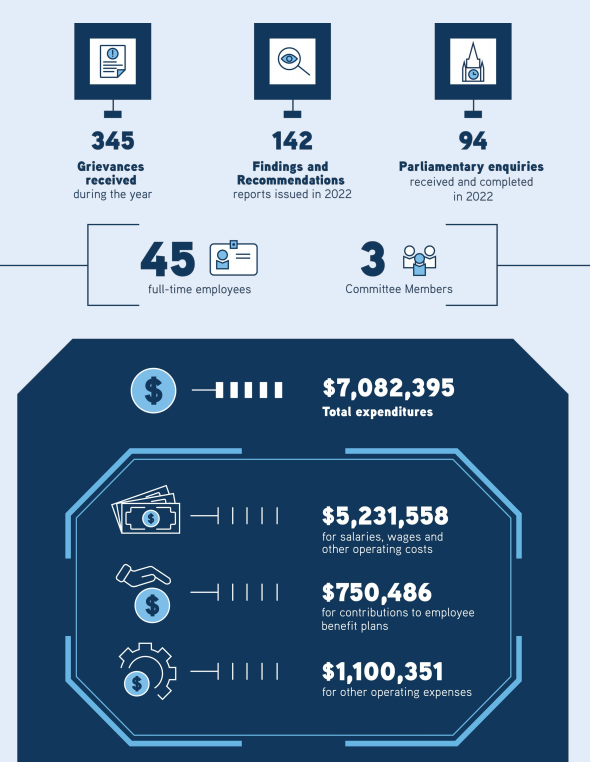
Text description
345 grievances received during the year
142 Findings and Recommendations reports issued in 2022
94 Parliamentary enquiries received and completed in 2022
Workforce for 2022
- 45 full-time employees
- 3 Committee Members
Expenditures
- $5,231,558 for salaries, wages and other operating costs
- $750,486 for contributions to employee benefit plans
- $1,100,351 for other operating expenses
- Total expenditures: $7,082,395
Corporate achievements
Evolution toward a modern, hybrid workplace
At the outset of Blueprint 2020, the Committee's vision was to adopt a modern, hybrid model where employees were entirely mobile and had all the necessary technology and equipment to do their work.
While great strides to achieve this vision were undertaken from 2016 to 2020, a working group was created in 2021 to augment implementation of this vision. All positions at the Committee were assessed to determine if the duties needed to be performed in the office or could be fulfilled remotely. Results indicated that 84% of positions are fully compatible with remote work while some positions would require an in-office presence in order to perform tasks related to technology infrastructure, security, facilities management or any work on secret classified files. Consequently, the Committee decided to embrace the GC-wide movement and shift to a workstation concept. Prior to re-opening the workplace, the working group conducted an office depersonalization exercise and the new office spaces were equipped with standardized ergonomic furniture and IT equipment. An office reservation tool is being customized and will soon be operational so that employees can efficiently and easily reserve their office space when going into the office. Health and safety inspections were performed and the Committee ensured all its staff were certified in First Aid. This measure was taken to ensure that any employee in the office would be properly supported in case of an emergency. On October 5th, the Committee opened its doors to all employees wanting to work from the office.
Technology
The Committee continued implementing its four-year road map that will see our Information Technology infrastructure migrated to the cloud by 2025. Migration efforts commenced this year and we also introduced multi-factor authentication (MFA) for all employees. By migrating to the Microsoft 365 platform, we are improving employee's ability to collaborate easily and safely while working remotely.
Diversity and inclusion
Following a blog series that challenged employees to reflect on issues faced by employment equity groups, the Committee conducted an anonymous survey of its employees to evaluate the effectiveness of this approach, which relied on individual proactivity to read the posts, look at the work environment and self-assess. Results indicated that not only was there a tangible, positive impact on parts of the organization, but also that employees wanted to continue to receive related information and participate in similar activities. One employee wrote:
“I am glad we are coming back to this. My thought during last year's
deep dive was that systemic barriers don't get knocked down overnight.
Change and growth are processes that require commitment and
continued reflection. Keep it up!''
The call for Champions for Employment Equity, Diversity and Inclusion, Mental Health and Well-being, Official Languages and Beyond 2020 was made to anyone at the Committee with an interest. This resulted in an all-new Champions Committee with the unique opportunity to share their experiences and knowledge. The Champions Committee established priorities for the year, based on various sources of information, including Government of Canada and interdepartmental champions’ priorities, the results from internal surveys and the Committee's Mental Health Dashboard. With approval from senior management, the Champions fleshed out an action plan for implementation in 2023.
As set out in the Employment Equity RegulationsFootnote iv , the Committee initiated a review of its employment systems, policies and practices to ensure barrier-free appointment processes for all employment equity groups. The Committee is currently at the analysis stage and the findings, recommendations and way forward will be communicated to senior management early next year.
The Committee’s first Accessibility Plan, published this year, was developed by a working group of employees who self-identified as persons with disabilities. Actions were established that target the elimination and prevention of the barriers identified within the organization. The goal is to foster a culture of inclusiveness, putting the focus on accessibility at the Committee. Additionally, the Committee will measure and report on progress with respect to the implementation of these actions.
Recognition
Recognition continues to remain a priority for senior management. The Awards and Recognition Program at the Committee encourages excellence, initiative and personal commitment. The program focuses on acknowledging employee accomplishments that reflect and promote the mandate, mission and corporate values of the Committee. This year two employees were recognized in the following category:
Chairperson's Award
The Chairperson's Award recognizes exceptional work performance and meritorious contributions, which go beyond the normal expectations of an individual or a team. This award is given to a person or team for outstanding client service, professional excellence, continuous improvements or teamwork.
The 2022 recipients of the Chairperson's Award were Mathieu Gervais and Nadia Petrella.
Mathieu Gervais
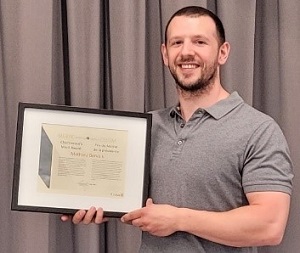
This award was presented to Mathieu not only for his outstanding work in the area of finance, but also for his willingness to take on the role of Procurement and Security Officer. Mathieu’s hard work and dedication throughout the year contributed significantly to the advancement of the Committee's priority projects. Mathieu is highly appreciated by his colleagues for his professionalism and team spirit. He has been an example of resilience for the organization.
Nadia Petrella
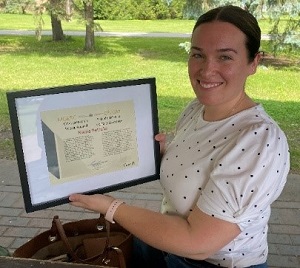
This award was presented to Nadia for her outstanding contributions to the Committee’s operations. Nadia performs her duties and helps her colleagues in achieving organizational objectives with a positive attitude. This has contributed directly to the Committee achieving the best results in its history. Nadia applies high quality standards in reviewing Findings and Recommendations reports. Nadia’s best practices show her commitment to delivering high quality reports. With her strong professional relationships, Nadia plays a key role in the integration and training of new employees within the Operations team.
Mental health and well-being
The Committee continued to foster a safe and healthy work environment by, among other things, offering 10-minute virtual weekly meditation sessions and encouraging employees to participate in Friday lunchtime yoga classes. The Committee, whose Informal Conflict Management Services and Ombudsperson Service are provided by Health Canada Employee Assistance Services, reminded and reinforced these services via a Health Canada information session for all employees, in both official languages. The Committee continued to publish information on mental health and wellness on its intranet, sharing resources and promoting key events such as ‘Bell Let's Talk Day', Mental Health Week, Mental Illness Awareness Week and World Mental Health Day. The Vice-Chairperson led another Healthy Workplace Challenge throughout the month of October, which promoted virtual high-fives and paying it forward.
The Committee is presently putting in place a safe space environment. Some employees, who volunteered to become safe space ambassadors, will first be required to take specific, mandatory training. Afterwards, any employee will be able to reach out to these ambassadors in private to discuss issues, receive support and be directed to resources for further support and professional help, without judgment or fear of reprisal.
Communications
The priority this year was to resume publishing the Committee’s case summaries on its website. The Communications team collaborated with the Registry Office to publish over 200 case summaries in 2022 and they will sustain this pace in 2023. The Communications team also updated the online case summary reference index, making it easier to use for both visitors to the site and Committee staff. Internal communications remained the essential communication channel. The intranet home page and two active blogs were utilized daily to keep employees up to speed on Committee and Government of Canada priorities, news, information and initiatives. In a digital, hybrid work environment, the intranet has become the most significant information conduit between senior management and employees and between the Committee and the Government of Canada.
About the Committee
Mandate
The Committee is an independent administrative tribunal reporting to Parliament through the Minister of National Defence. It reviews all military grievances referred to it by the Chief of the Defence Staff, as stipulated in the National Defence Act (NDA) and article 7.21 of the Queen’s Regulations and Orders for the Canadian Forces (QR&O).
Section 29 of the NDA provides a statutory right for an officer or a non-commissioned member to grieve a decision, an act or an omission in the administration of the affairs of the CAF. The importance of this broad right cannot be overestimated since it is, with certain narrow exceptions, the only formal complaint process available to CAF members.
Since beginning operations in 2000, the Committee has acted as the external and independent component of the CAF grievance process. It also has the statutory obligation to deal with all matters as informally and expeditiously as the circumstances permit.
Following its review of referred military grievances, the Committee provides its F&R reports to the CDS and the grievor. The CDS is the final decision-maker and is not bound by the Committee’s F&R reports. In any case where the Committee’s F&R reports are not accepted, the CDS must provide the reasoning in writing.
TypesFootnote v of grievances referred to the Committee
1. Mandatory referrals are grievances relating to one or more of the following matters:
- administrative action resulting in the forfeiture of or deductions from pay and allowances, reversion to a lower rank or release from the Canadian Forces;
- the application or interpretation of Canadian Forces policies relating to the expression of personal opinions, political activities, candidature for office, civil employment, conflict of interest and post-employment compliance measures, harassment or racist conduct;
- pay, allowances and other financial benefits;
- the entitlement to medical care or dental treatment; and
- any decision, act or omission of the CDS in respect of a particular officer or non-commissioned member.
2. Discretionary referrals: The CDS has the discretion to refer any other grievance to the Committee.
Structure
The Committee consists of Committee Members, appointed by the Governor in Council (GIC)Footnote vi , who are responsible for reviewing grievances and issuing F&R reports.
Under the NDA, the GIC must appoint a full-time Chairperson and at least two Vice-Chairpersons. In addition, the GIC can appoint any other Committee Members that the Committee may require to carry out its functions. Appointments are for up to four years and can be renewed.
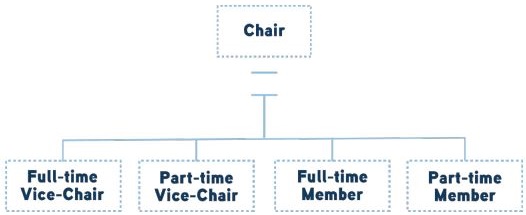
Text description
1 Chair
1 Full-time Vice-Chair
1 Part-time Vice-Chair
1 Full-time Member
1 Part-time Member
The Committee Members work with the support of the registry staff, legal advisors, team leaders and grievance officers who provide analysis and advice on a wide range of issues. The responsibilities of the Committee’s Internal Services include administrative services, strategic planning, security, performance evaluation and reporting, human resources, finance, information management, information technology and communications.
Management Team
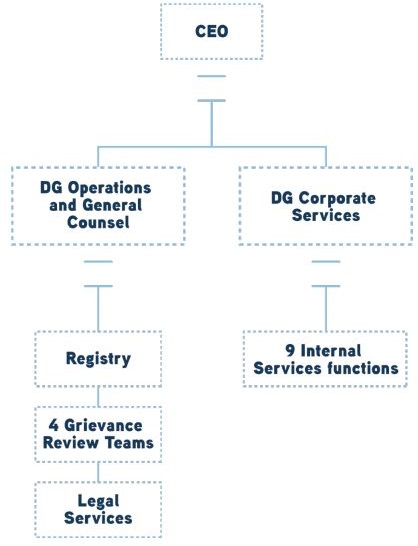
Text description
1 Chief Executive Officer
1 Director general, Operations and General Counsel, made up of the Registry, 4 Grievance Review Teams and Legal Services
1 Director general, Corporate Services, made up of 9 Internal Services functions
Grievance Process
Canadian Armed Forces grievance process
The CAF grievance process consists of two levels and begins with the grievor’s commanding officer (CO).
Level I: Review by the Initial Authority (IA)
Step 1: The grievor submits a grievance in writing to their CO.
Step 2: The CO acts as the IA if they can grant the redress sought. Otherwise, the Canadian Forces Grievance Authority assigns an appropriate IA. Should the grievance relate to a personal action or decision of an officer who would otherwise be the IA, the grievance is forwarded directly to the next superior officer who is able to act as IA.
Step 3: The IA renders a decision and, if the grievor is satisfied, the grievance process ends.
Level II: Review by the Final Authority (FA)
A grievor, who is dissatisfied with the IA’s decision, is entitled to have their grievance reviewed by the FA, which is the CDS or their delegate.
Step 1: The grievor submits their grievance to the CDS (or their delegate) for FA-level consideration and determination.
Step 2: Depending on the subject matter of the grievance, the CDS may be obligated to, or may at their discretion, refer it to the Committee. If the grievance is referred for consideration, the Committee conducts a review and provides its F&R report to the CDS and the grievor. Ultimately, the FA makes the final decision on the grievance.
Committee grievance process
The Committee’s internal review process consists of three steps: grievance reception, review and the drafting of F&R reports.
1. Grievance reception
Upon receipt of a grievance, the grievor is contacted and invited to submit additional comments or other documents relevant to their case.
2. Review
The assigned Committee Member holds a case conference where the grievance is reviewed and the issues are identified and discussed. The Committee Member works with a team leader, a grievance officer and legal counsel. If necessary, additional documentation is obtained and added to the file, and subsequently disclosed to the grievor. Although rare, it is possible a hearing may be held.
3. Findings and Recommendations
The Committee Member issues a F&R report, which is then sent simultaneously to both the CDS and the grievor. At this point, the Committee no longer has jurisdiction over the grievance. The grievor receives a decision directly from the FA.
Vihar Joshi

Vihar Joshi joined the Military Grievances External Review Committee in 2018 as Director General of Operations and General Counsel. In December 2022, he assumed the role of Interim Chairperson and Chief Executive Officer.
As Director-general, Mr. Joshi’s leadership contributed to the Committee achieving the best two production years since inception in 2000. He also led the internal grievance process review at the Committee, generating a leaner and more efficient process.
Prior to joining the Committee, Mr. Joshi served as a Legal Officer in the Canadian Armed Forces (CAF) for 28 years. Aside from providing legal advice at the unit level, he served as Director of Legislative and Regulatory Services, Director of Law/Human Resources, Director of Pensions and Finance Legal Services, Director of Law/Compensation and Benefits, and Assistant Deputy Judge Advocate General/Operations. He was also the Special Assistant to the Judge Advocate General. Upon promotion to Colonel, Mr. Joshi assumed the position of the Deputy Judge Advocate General/Military Justice and Administrative Law. His last posting in the CAF was as the Deputy Judge Advocate General/Administrative Law, a position he held for nine years.
During his time in the CAF, Mr. Joshi deployed on a number of operations. In 1996, he deployed to Haiti as the legal advisor to the Commander, Canadian Contingent, United Nations Support Mission in Haiti. In 2002, he deployed to Bosnia in support of Canada’s commitment to NATO where he served as the Deputy Legal Advisor to the Commander Stabilisation Force. In 2007, he deployed to Afghanistan for a one-year period with the Strategic Advisory Team-Afghanistan as part of Operation Argus. In that capacity, he was a senior advisor to Afghanistan's Minister of Justice and mentor to the senior staff of the Ministry of Justice. For his work in Afghanistan, Mr. Joshi was awarded the Meritorious Service Medal.
In 2013, he was appointed as an Officer of the Order of Military Merit. In 2014 he was appointed as Queen’s Counsel (now King’s Counsel). In 2020, he was awarded the Law Society Medal by the Law Society of Ontario.
M. Joshi holds a Bachelor of Administration from the University of Ottawa, a Bachelor of Laws from Osgoode Hall Law School and a Master of Laws in legislative drafting from the University of Ottawa. He has completed the Advanced Program in Human Resource Management at Rotmans (University of Toronto) and holds the designation of Certified In-House Counsel – Canada.
François Malo

Appointed in May 2018, Part-time Vice-Chairperson François Malo served a three-year term. In March 2021, he was re-appointed for a second three-year term.
Mr. Malo is a veteran of the CAF. He commanded combat missions during the North Atlantic Treaty Organization (NATO) air campaign against the former Yugoslavia, served as Base Commander in North Bay, and held the positions of Director of Space Development and Director General, Canadian Forces Grievance Authority in National Defence Headquarters. It is during this last tenure that Mr. Malo developed unique expertise and experience in the control and administration of the CAF.
Mr. Malo holds a Bachelor of Arts in Political Science, with a minor in Canadian History, from the University of Manitoba. He is also a graduate of Queen's University Public Executive Program and a certified tribunal member by the Council of Canadian Administrative Tribunals.
Nina Frid

Appointed in February 2018, Full-time Committee Member Nina Frid served a four-year term. She was reappointed in June 2022 for a second four-year term.
Ms. Frid has significant leadership experience as a senior executive in the federal public service and extensive experience in policy and regulatory matters. She also has considerable experience leading dispute resolution services at a federal administrative tribunal.
Ms. Frid graduated with a Master's in Law from Osgoode Hall Law School, York University and a Master's in Business Administration from Carleton University. She also holds a certificate in Advanced Alternative Dispute Resolution from University of Windsor Law School and Bachelor-Honours in Economics from the University of Marine Transportation, in St. Petersburg, Russia. Ms. Frid is a member of the Council of Canadian Administrative Tribunals.
Eric Strong

Appointed in December 2017, Part-time Committee Member, Eric Strong served a three-year term, which was extended by one year in December 2020. He was then reappointed in June 2022 for a second three-year term.
Mr. Strong has over thirty years of experience as an Air Navigator on the Sea King naval helicopter in the CAF, as a civilian employee with the Department of National Defence and in the private sector. He has extensive knowledge of the CAF and its finance and personnel policies. Additionally, he has garnered broad experience working in a client-focused environment within the government.
Mr. Strong graduated from the Richard Ivey School of Business, Western University with a Master's of Business Administration. He also holds a Bachelor of Mechanical Engineering from Carleton University. Mr. Strong is an accredited Project Management Professional (PMP) from the Project Management Institute and a Certified Management Consultant (CMC) from the Canadian Association of Management Consultants. He is also a certified tribunal member by the Council of Canadian Administrative Tribunals.
Dominic McAlea

Appointed in March 2018, Full-time Vice-Chairperson Dominic McAlea served a four-year term, which ended March 2022.
Mr. McAlea was a senior executive with the CAF, Department of Justice and Global Affairs Canada, serving as a Deputy Judge Advocate General in the CAF and Canadian Defence Attaché to Afghanistan, in Kabul. His expertise includes strategic planning, development and implementation of policy, Federal legislation and regulations, criminal and civil accountability systems, and consensus building nationally and internationally.
Mr. McAlea holds a Bachelor of Laws from the University of Windsor; Master of Laws in Public International Law from the London School of Economics and Political Science; and a Master of Philosophy in International Relations from the University of Cambridge.
Christine Guérette

Christine Guérette, CPA, CGA, was appointed Chairperson and Chief Executive Officer of the Committee in June 2018 for a four-year term, which ended in June 2022. Prior to her appointment, Ms. Guérette served as the Committee’s Director General, Corporate Services and Chief Financial Officer.
Prior to joining the Committee, Ms. Guérette held various senior executive positions in the federal public service: Chief Financial Officer at the Canadian Transportation Agency; Member of the Faculty at the Canada School of Public Service; and leadership positions at the Canadian International Development Agency (now Global Affairs Canada).
Ms. Guérette has led significant transformation initiatives throughout her career. She has upheld the Beyond 2020 tenets of agile-equipped-inclusive for years, implementing nimble corporate governance principles, and efficient accountability and business processes to enhance the performance of organizations. Along the way, Ms. Guérette has nurtured meaningful relationships with colleagues, stakeholders, senior government officials, representatives of non-governmental and private sector organizations, and international partners.
Ms. Guérette holds a Bachelor of Science in Accounting from the Université du Québec à Hull and has been a member of the Quebec Order of Chartered Professional Accountants since 1994. During her tenure as Chairperson, Ms. Guérette was a member of the Treasury Board of Canada Secretariat Small Departments Audit Committee.
Contact us
Military Grievances External Review Committee
60 Queen Street, 9th floor
Ottawa, Ontario K1P 5Y7
Tel: 613-996-8529
Toll free: 1-877-276-4193
mgerc.information.ceegm@mgerc-ceegm.gc.caFootnote vii
www.canada.ca/en/military-grievances-external-review.htmlFootnote viii
Endnotes
Page details
- Date modified: